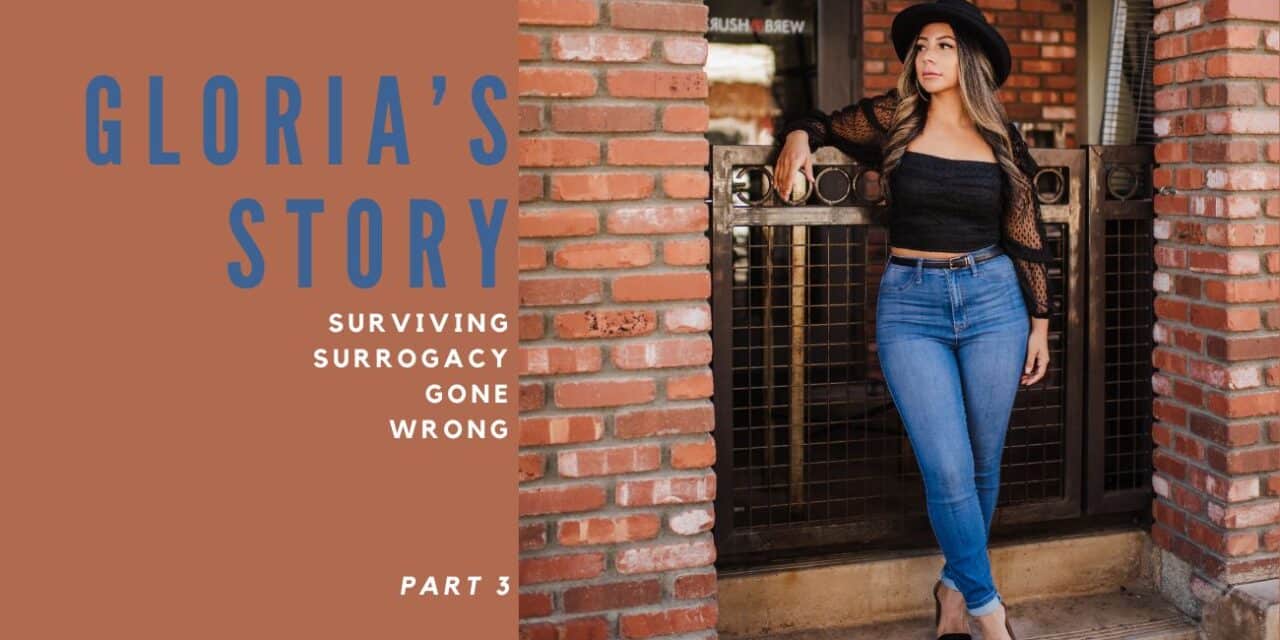For Gloria, “once contracts were completed” the intended parents, “very quickly changed their personality” and Gloria wanted to back out, reaching out to her caseworker (recall the support person) multiple times, but Gloria felt nothing but pressure to keep going:
And as much as I wanted to back out, the agency then starts to pressure you into not backing out… I had called the caseworker multiple times saying, you know, I just don’t think I can go through with this and I was constantly threatened with breach of contract and ‘you’re going to have to pay this back. You’re going to have to pay the lawyer fees, the health insurance policy, and the medical clearance back’. So, I mean, I felt like I had no choice but to continue. That only got worse as the pregnancy progressed.
Feeling pressured, Gloria continued and an embryo created from a “donor” egg and the intended father’s sperm was transferred into Gloria’s womb. The perfect example of third-party reproduction where two different women are used to create a child for someone else, truly muddying the waters of lineage and origin for the child in question and increasing the risk of health complications in life for both women. This article won’t get into specific risks for egg-donors or the ethical problems of such a practice, but readers should be well aware that women have lost their fertility and lives “donating” eggs to “families in need”. Further, surrogate mothers are often ill-informed about the risks of carrying a child from a “donated” egg.
Two things stick out to Gloria about the embryo transfer. First, she was misled about the number of available embryos the IPs had available. Some IPs have more than one embryo transferred at a time into the womb of the surrogate to improve success, increasing the chance for multiples and also increasing the risk of complications to the surrogate mother and children she carries. Other IPs only transfer one embryo at a time, but have embryos waiting on ice to use in case of failure. “It’s always nerve wracking, and it was more nerve wracking because I hadn’t been told that this couple only had two embryos created.” In other words, there were only two chances for Gloria to become pregnant; Gloria was told they had six. Therefore, if the IPs needed to create more embryos, Gloria would have to wait and be locked into a contract while waiting, a process that can take up to a year or more. Bottom line, Gloria was lied to.
Secondly, “embryo transfer day was the first time meeting the intended father in person” and although the transfer went well, a private interaction with the intended father left her “mortified”, “violated” and “uncomfortable”.
And that is really the moment I truly realized that I should have gone with my gut. Like this journey is only going to get worse. I immediately came home and I called the caseworker, aka my support person, and she laughed it off. She said, ‘he’s just being silly. Ignore it.’
Gloria certainly didn’t laugh it off, but she had no choice but to continue. The transfer was a success. She was pregnant.
This is part three of a five part series. Over the several weeks we will be releasing a write-up based off of our exclusive interview with Gloria.
Watch the full interview with Gloria on our YouTube channel.
Part Five
Author Profile

- Kallie Fell, MS, BSN, RN, started her professional career as a scientist in the Department of Obstetrics and Gynecology at Vanderbilt University Medical Center utilizing a Master of Science degree in Animal Sciences with an emphasis on Reproductive Physiology and Molecular Biology from Purdue University. While assisting in the investigation of endometriosis and pre-term birth, Kallie simultaneously pursued a degree in nursing with hopes of working with women as a perinatal nurse. After meeting Jennifer at a conference, Kallie became interested in the work of the Center for Bioethics and Culture and started volunteering with the organization. It is obvious that Kallie is passionate about women’s health. She continues to work, as she has for the past 6 years, as a perinatal nurse and has worked with the CBC since 2018, first as a volunteer writer, then as our staff Research Associate, and now as the Executive Director. In 2021, Kallie co-directed the CBC’s newest documentary, Trans Mission: What’s the Rush to Reassign Gender? Kallie also hosts the popular podcast Venus Rising and is the Program Director for the Paul Ramsey Institute.









